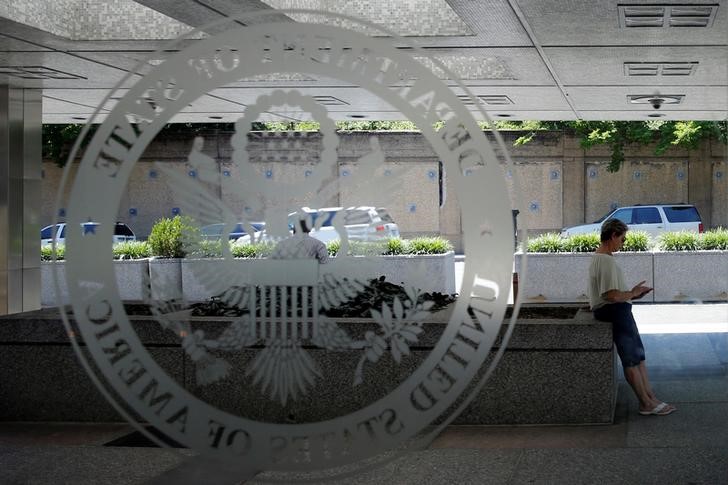By Jonathan Landay
WASHINGTON (Reuters) -The U.S. State Department on Friday marked the first anniversary of Russia's full-scale invasion of Ukraine by sanctioning more than 60 top Russian officials, including cabinent ministers and regional leaders, and three nuclear weapons institutes.
Also targeted, a department statement said, were scores of other Russian officials and entities, a Russian involved in the theft of grain from Ukraine and the official who oversees its main nuclear power plant, seized by Russian troops early in the invasion.
In other actions, the department slapped U.S. visa restrictions on more than 1,200 members of the Russian military and banned entry into the United States of three military officials it accused of "gross human rights violations" and their families.
The sweeping measures were part of a wave of new sanctions that President Joe Biden's administration announced on the anniversay of the invasion, in coordination with U.S. partners and allies.
"We remain committed to supporting the people of Ukraine and are redoubling our efforts to promote accountability for the Kremlin's war," Secretary of State Antony Blinken said in a statement.
Tens of thousands of Ukranians have died in the war ignited by Russia's onslaught, millions have been driven from homes and villages while towns and cities have been destroyed.
The State Department said it took its latest actions under an executive order authorizing "sanctions with respect to specified harmful foreign activities" by Moscow.
Under the measures, any U.S. property owned by those designated or controlled on their behalves by a U.S. citizen are blocked.
Among those hit by the latest sanctions were nearly 50 governors and other regional leaders and nine members of President Vladimir Putin's cabinet, including Energy Minister Nikolai Shulginov.
Others targeted included senior Putin aides, Anna Surovikina, wife of General Sergei Surovikin, who was removed in January from command of Russian forces in Ukraine, and Olga Skabeyeva, a leading propagandist on state television.
They also included Oleg Romanenko, appointed to oversee the Russian-occupied Zaporizhzhia Nuclear Power Plant, the largest in Europe, which frequently has been threatened by shellfire that has stoked fears of a major disaster.
Russian attacks on the Ukrainian plant and its seizure "underscored the global concerns related to nuclear energy security and undermine the Kremlin's efforts to portray itself as a responsible supplier of nuclear energy products," Blinken said.
The department's latest sanctions hit three institutes involved in designing and supporting Russia's nuclear weapons stockpile, the world's largest nuclear arsenal, and other defense-related entities.
Putin has raised concerns with what were seen as threats to use nuclear weapons. But the Russian leader denied harboring such intentions.
On Tuesday, he announced that Moscow was suspending its participation in the New START treaty, the last nuclear arms control pact with the United States. On Thursday, he said he planned to strengthen Russia's nuclear forces.
The sanctions also hit Leonid Pasechnik, who Putin appointed interim leader of one of two self-declared republics seized by Russia-backed separatists in a partial invasion of Ukraine in 2014.
